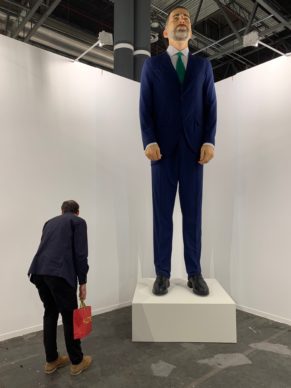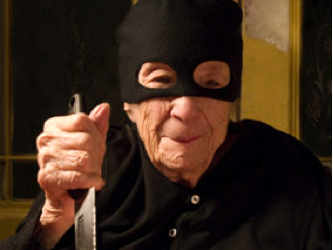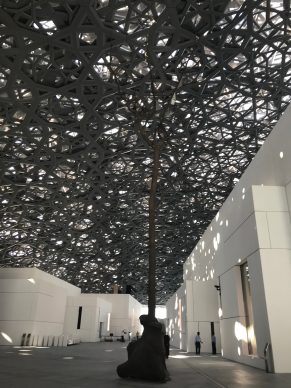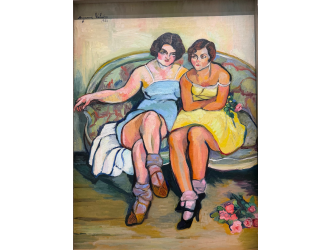The end of colonial ruls
Even before the world was put on hold due to the arrival of a highly contagious virus, our society was already experiencing a profound shift in values. A number of countries that were once subject to colonial rule are now seeking reparations from the nations that invaded them, for repeated historical acts of looting.
Sense of justice
The yardstick for our moral references has perceptibly moved, and the sense of justice between the dominant and the dominated is assuming new forms.
Museums as megaphones
In conjunction with these upheavals, the museum world – which acts as a moderate megaphone for our society’s evolutions – is also experiencing its own minor revolution.
Last great flagship

Musée du Quai Branly
In France, the most radical and spectacular appointment in this sector that we’ve witnessed in recent years was announced while the country was still half-asleep, on 27 May 2020. This was when the last great flagship French institution, the Musée du Quai Branly (museum of African, Asian, Oceanic and American civilizations) rechristened the Musée Jacques Chirac, revealed the name of the new director of the museum: curator and former archaeologist Emmanuel Kasarhérou.

Musée du Quai Branly
Born in Nouméa
He was born in 1960 in Nouméa, the capital of New Caledonia, a French territory formed of a multitude of islands situated 16,740 kilometres from the mainland and controlled by France since 1853. Emmanuel Kasarhérou’s father is Kanak, from the indigenous people of the region, and his mother is a French mainlander intellectual.
Specialist of Houailou language
Up until recently he had been serving as deputy to the director of the collections at the Quai Branly and he is a specialist in the Houailou language, among other things, which is spoken in the centre of New Caledonia.
Native of a former colony

André Liotard @ Musée du Quai Branly
It’s significant that a native of a former colony has been appointed the head of what might be considered to be the museum of former French colonies, since 60% to 70% of the collections at the Quai Branly come from the colonial occupation.
Mixed heritage
And while emphasis on skin colour remains a largely American preoccupation, we also note that the new head of the Quai Branly is a man of mixed heritage. This is a first for a big museum in France.
Symbolic significance
This decision, which has major symbolic significance, has gone broadly unnoticed during these turbulent times. It has clearly come from Emmanuel Macron himself. The ministry of culture has lost its influence over key appointments and Brigitte Macron, often seen as the alternative culture minister, didn’t have a direct say on this sensitive issue.
Black voices

Musée du Quai Branly
A museum like the Quai Branly has a fundamental role to play at a time when black voices are trying to make themselves heard in France, similarly to in the United States.
90% of the staff are white
One source close to the institution, who prefers to remain anonymous, also points out that: “90% of the staff at the Musée Jacques Chirac, excluding the museum attendants, are white. It is very difficult for curators who haven’t followed a classical curriculum to be accepted by an institution that is traditionalist on principle, even at the Quai Branly.” Claude Chirac, daughter of the former French President, was clearly consulted on the issue.
Stéphane Martin

Musée du Quai Branly
Stéphane Martin, the former head of the museum (he presided over the institution from when it was established in 1998) most likely had something to do with the appointment of this archaeologist. For him, Kasarhérou’s strength lies in his global vision: “His outlook was formed on the other side of the world. That is an extremely rare and precious thing in France. When you’ve served as director of the Musée Jean-Marie Tjibaou in Nouméa, as Emmanuel has, you think that the closest big metropolises are Tokyo or Los Angeles. He is very familiar with the approach of museums in New Zealand, for example.”
To negotiate
Marie Lavandier, the current head of the Louvre Lens, welcomes the decision: “We mustn’t reduce his appointment to a symbol. He’s a very brilliant yet modest man who knows how to listen and negotiate. He will know how to navigate the complexity of the current world.”
Not like a revolutionary

Emmanuel Kasarhérou
As for the man in question, he appears very poised and cerebral as he receives us in his vast office with a wall of vegetation, the calling card of star architect Jean Nouvel. Wearing a chic suit and tie, he doesn’t look or talk like a revolutionary.
Profound changes
But he seems to want to make profound changes: “Museums have to recognize that they must establish a dialogue with traditional cultures. Heritage is not only made up of objects from certain traditional societies. Its substance also lies in orality. This is why the Sahel exhibition at the Metropolitan Museum is remarkable.
Beauty and meaning

Musée du Quai Branly
Having a sense of beauty and meaning at the same time, focusing on our collections… We must also confront colonial history with realism. The 380,000 objects in the permanent collection must be presented in a transparent way using the appropriate vocabulary. Think about the use of the term “art nègre” for example, which has taken on a very different tone over time. It needs to be explained. I don’t feel that I am in a position to pass judgement on the past. However, we have a huge social role to play. The aim is for us to reach the largest audience possible without adopting a dominant stance specific to those in the know.”
Restitution of African objects
The most delicate issue that the new head of the Quai Branly will have to confront is the burning question of the restitution of African objects to their countries of origin. “There are different questions to consider. In the case of Benin, a draft bill is shortly due to be presented at parliament. The critical element consists of knowing how we can share this heritage. It’s a journey that we must make together. There is currently a lack of space for dialogue with the museums of West Africa.”
Between protecting the treasures of French museums and respecting the origins of African artefacts, the man of symbols has a lot of work to do.
Support independent news on art.
Your contribution : Make a monthly commitment to support JB Reports or a one off contribution as and when you feel like it. Choose the option that suits you best.
Need to cancel a recurring donation? Please go here.
The donation is considered to be a subscription for a fee set by the donor and for a duration also set by the donor.




